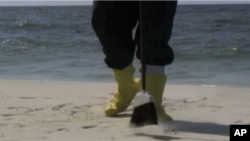Concern is growing about the effects of the ongoing oil spill in the Gulf of Mexico, and some residents are taking action to try to help. Some people are monitoring the beaches, while others are devising their own clean-up solutions.
"We might as well start at the end," said volunteer Trish O'Neal. Since she retired to Perdido Key, she finds time every day to walk the beach. This day, she has a special reason for doing it. "I'm a volunteer with the federal park system," she tells a family on the beach. "Did you have any questions for me today regarding the oil?"
She is one of 35 people who have been trained by the National Park Service since oil began washing up along park grounds on Perdido Key. O'Neal talks to visitors about native birds, and sensitive dunes, but most ask about the oil. "Mostly people are wanting to know what does it look like. They don't know what the oil looks like, and it is so [small], that we point it out to them. The other thing is: are they safe," she said.
The first signs of contamination from the spill were tar balls on beaches around Pensacola. Oily globs started appearing on Thursday, and sand on Perdido Key is now stained from oily residue. But O'Neal tells sunbathers it is still safe to swim.
"We don't have enough on our beach to be a big concern. But we don't want people to [touch it], it is a toxin," said O'Neal.
The oil spill poses a threat to fishing and recreation businesses across the Gulf. For O'Neal, the bigger concern is protecting wildlife and their native habitats. "It's for the animals. And the animals, you can't replace them if they are gone forever. The beach will return," she said.
Many other residents along the Gulf coast share that concern for the future of the region. Some are taking action, by cleaning up portions of beach by themselves.
Even actor Kevin Costner is getting involved. The star told lawmakers in Washington about a device his company has developed to remove oil from the water. "The cost of recovering a spill on the ocean is a fraction of the cost of cleaning it on the shore," he said.
While BP has now ordered 32 of Costner's machines to use in the Gulf, the actor says he was frustrated by previous responses to his idea. "My enthusiasm for what the machine could do was met with apathy. A refusal to move off the status quo," he said.
In spite of the challenges, inventors continue to share their ideas. John Galarneau has built a system called Oil Trap to collect surface oil. "We have a boom coming out this way to one side, and a boom out this way. So when the oil begins to tack in, it will be funneled and collected into these systems," he said.
Galarneau said the idea was born of frustration at the clean-up effort and the lack of equipment for the job. "I'm surprised it hasn't been done before. And this will stop the oil from going into the estuaries," he said.
Galarneau stopped in Pensacola Beach, at the start of a tour of the Gulf. He hopes to sell Oil Trap units to affected communities. He says the goal is not to make money, but to protect the ecosystem. "There are still a lot of beautiful estuaries that are going to be destroyed. If I can do anything and be a part of this I would like to see our estuaries protected. I'm an outdoorsman, I spend a lot of time in the [Florida] Everglades, fishing in the flats. This is just a devastating thing," he said.
For those who enjoy Pensacola Beach, every contribution to the clean-up effort is welcome.
US Oil Spill Draws Help from Volunteers, Inventors




